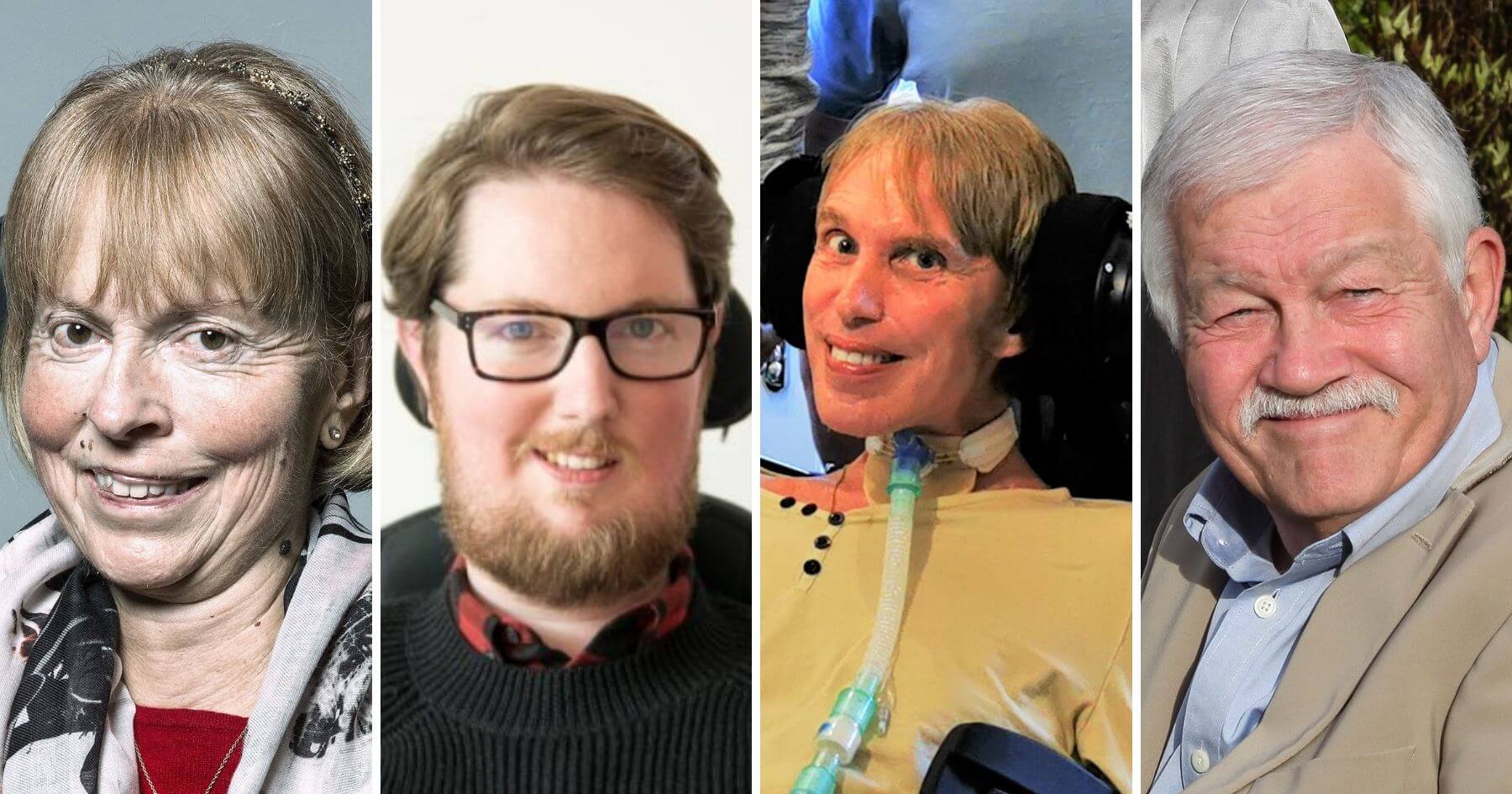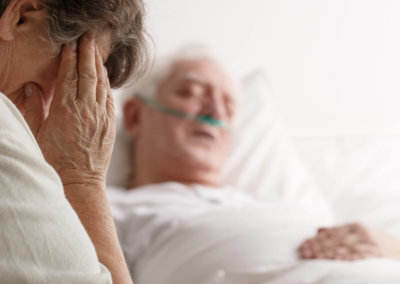The All-Party Parliamentary Group for Dying Well held a public event on Thursday 15 July in which leading disability rights campaigners spoke powerfully against Baroness Meacher’s assisted suicide bill.
The cross-party parliamentary group was formed earlier this year in order to unite against renewed calls to make assisted suicide legal in the UK.
The event was opened by the Group’s Chair, Danny Kruger MP, who emphasised “the absolutely central importance of the rights of disabled people in this debate”.
Founder of “Not Dead Yet UK” and Crossbench Peer, Baroness Jane Campbell, who has spinal muscular atrophy, led the discussion.
“Dignity in life should be achieved before dignity in death”
Dr Miro Griffiths, Leverhulme Research Fellow at the University of Leeds, argued that “it’s not a safe time to be introducing this bill, because of the historical legacy of injustice experienced by several people, but also because, currently, we are going through a pandemic, which has exacerbated the marginalisation experienced by the by itself people”.
“Often the language that is used, surrounding the terminology surrounding advocates for assisted dying, propose this idea of relieving a burden or relieving stress on families and informal networks. But we’ve seen this also translated in countries where there is assisted dying and assisted suicide infrastructure”.
“We see examples such as in Oregon, where these sorts of opinions become integrated within medical practice, where we see people being offered assisted suicide, because perhaps other treatments and support infrastructure is not available, or is not as desirable as this option. We see situations where families have recorded accounts where health professionals have raised the option of assisted suicide as a way to spare or relieve the burden on families and individuals”.
He emphasised his view that “dignity in life should be achieved before dignity in death”, and that “The Assisted Dying Bill is unsafe, dangerous, and should not be considered when people are experiencing widespread barriers in their daily lives”.
“Insufficient protections”
World-leading robotics and artificial intelligence scientist Dr Peter Scott-Morgan addressed the meeting via a computer-generated avatar: ”I find myself intuitively supporting the Bill. To me, its intentions appear so obviously reasonable, compassionate, humane. But as a scientist, I’m trained to question even the most obvious”.
Scott-Morgan, who himself has motor neurone disease, went on: “The apparently self-evident truth that with an untreatable condition such as late-stage motor neurone disease (MND), with someone diagnosed as being within six months of death, there is no reasonable expectation that the patient can not only survive but thrive for many years, with an increasing quality of life is a crucial test for me”.
“If that seemingly ludicrous scenario occurred, even once, then it would unravel all the reassuring assumptions underpinning my intuitive support for the bill. Everything would be called into question because of confusion about the likelihood, let alone inevitability, of intolerable suffering, concern that we are not only shortening the life by a few months, worry there are insufficient protections against patients not being fully informed, uncertainty between being terminal and simply being disabled”.
“Assisted suicide is essentially nihilistic”
Dr Phil Friend, former chair of the Royal Association for Disability Rights and of Disability Rights UK, who has lived with a disability since contracting polio aged 3, quoted pioneering palliative care physician Dr Robert Twycross, saying: “Assisted suicide is essentially nihilistic”, while “palliative care is based on the view that life is worth living up until the point of death”.
He explained how assisted suicide encourages a hopeless view of lives such as his, and that safeguards are “based on the idea that families will look after disabled relatives” despite many cases where families are abusive. He specifically highlighted Age UK’s research on financial abuse of relatives, which the Bill does not specify safeguards against.
He also pointed to examples of the policy around the world, saying: “there is evidence that in every jurisdiction where assisted suicide currently exists, they have been expanded to cover more and more people. And the huge percentage increases in the numbers of people applying for assisted suicide in those jurisdictions is scary, to put it mildly”.
He went on: “For the parliamentarians listening to this… you should not focus on personal choice or personal morality, but focus on public safety. This has to be the primary consideration, in all legislation. What we want you to do is to help disabled people to thrive, not to die”.
Baroness Campbell added: “I’m not sure that there are enough safeguards that can be fought up to remake this bill, to make it safe for everybody. I feel that having just come out of a pandemic, where hundreds of thousands of disabled and terminally ill people either lost their lives or had great problems surviving throughout, and the fact that we were not given the support to live, both help and also care wise, I think it’s probably insensitive to bring this about now. I think that we need to understand a lot more about what would really happen to the disabled and terminally ill in this country on a mass level before we start legislating for the odd individual”.
Dr Friend concluded: “I don’t believe that allowing the suicide act to be extended to include assistance to die necessarily helps the majority. It argues against providing good services at the end of life because it’s cheaper and quicker to end it. And we’ve got evidence from a number of economic papers that suggest that one of the big pushes is that long-term care costs a lot of money, whereas of course, assisted suicide drugs don’t. So for me, it’s not about personal issues, I do recognise that many people suffer or feel that they may suffer and want to do something about that and take control over their lives. But I think that puts the rest of us in jeopardy”.
Pushing the boundaries
Chair of the pro-assisted suicide group, ‘Dignity in Dying’, Baroness Meacher’s private member’s bill on assisted suicide received its First Reading in the House of Lords on 26 May this year, and a Second Reading is expected in the autumn.
The Bill follows the Marris-Falconer Assisted Dying Bill (2015), which was defeated by a majority of 330 to 118 MPs.
According to supporters of the Bill, Dignity in Dying, “[t]he bill is modelled on legislation that has been in place in Oregon, USA for over 23 years […]”.
Other countries that have introduced supposedly restricted assisted suicide and euthanasia legislation have seen an expansion of their laws as medical professionals and activists push the boundaries of acceptable practice.
Expanding euthanasia law
In the Netherlands, Canada, and Belgium, the law that permits euthanasia has rapidly expanded to include more categories of people.
Belgium legalised euthanasia in 2002 and since then, the practice has even been extended to children. The current law allows euthanasia if the patient is in a state of constant physical or psychological pain.
There is now a renewed push for euthanasia to be available for those who are healthy but have decided they have led a ‘fulfilled life’.
In the Netherlands, where euthanasia has been legal since 2002, doctors are now permitted to secretly sedate patients who have dementia before euthanising them. The law permits voluntary euthanasia for anyone over the age of 16, and children aged 13-15 can be euthanised with their parents’ consent. Earlier this year, the Dutch government said it would be changing the regulations to allow doctors to end the lives of terminally ill children between the ages of one and twelve.
Euthanasia has been legal in Canada since 2016. In 2019 however, following the euthanising of Alan Nichols, a former school caretaker who was physically healthy but struggled with depression, the legal requirement that a person be terminally ill before administration of euthanasia was dropped.
Bill C-7, recently passed by the Canadian Parliament, intends to further extend euthanasia legislation to people with disabilities and those with mental health issues.
Right To Life UK spokesperson, Catherine Robinson, said: “It is wonderful to see such a passionate discussion in which people with disabilities, all of whom have a track record of campaigning on behalf of the rights of people with disabilities, are speaking out against the prevailing – yet misleading – narrative on assisted suicide”.
“The overwhelming majority of doctors who work in end-of-life care, such as Dr Baker, continue to oppose assisted suicide. They know from experience that what vulnerable people need at the end of their lives is love and support, not offers to assist their death”.
“We also have increasing evidence that people’s wishes to die are transient. The Irish Longitudinal Study on Ageing, for example, surveyed 8,174 people over the age of 50 and found that 3.5% expressed a wish to die at Wave 1 of the study. However, 72% of these participants no longer reported a wish to die when reassessed two years later. We should seek to care for those experiencing suicidal thoughts, rather than state-sanction their deaths”.
“However well-intentioned, the legalisation of assisted suicide in certain circumstances will almost inevitably extend to the non-terminally ill who are suffering, as it has in other jurisdictions. It is no coincidence that many prominent people with disabilities, plenty of disability rights groups, and many respected healthcare professionals continue to rally against such legislation, for it strikes against the very heart of the dignity and care we ought to afford to each human being”.












